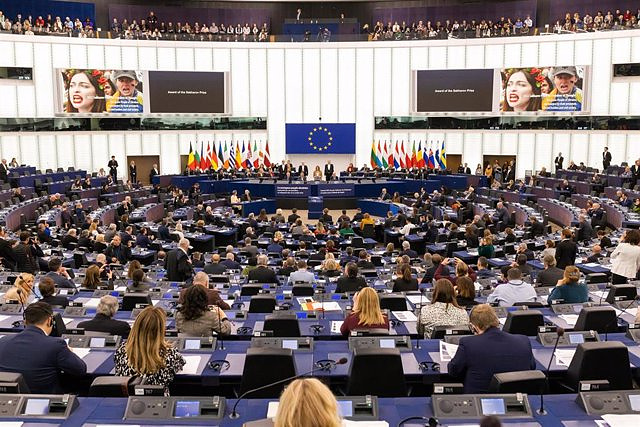BRUSSELS, 17 Ene. (EUROPE PRESS) -
The plenary session of the European Parliament has requested this Tuesday an extension of the scope and a tightening of the sanctions in the legislation to prevent companies from the European Union (EU) with no or minimal economic activity from benefiting from tax advantages in the Member States where are established.
MEPs have adopted this position by 637 votes in favour, 2 against and 6 abstentions that modify the Commission's proposal for a directive that establishes the criteria to determine a fictitious company used to avoid or evade taxes, the corresponding sanctions and the requirements of information.
The so-called 'Unshell' directive aims to establish transparency standards and objective indicators related to company income, personnel and facilities in order to help tax authorities detect abuses and flag fictitious entities.
Thus, the European Parliament has asked to slightly reduce the thresholds below which a company is exempt from the information requirements of the directive, and to establish sanctions that will also be imposed on companies with zero or low income.
To allow for a better distinction between legitimate and existing shell companies for tax purposes, MEPs are also proposing to amend information sharing requirements between member states to ensure better quality and integrity of the data being shared.
As far as penalties are concerned, the opinion of MEPs is that these should amount to a minimum of 2% of a company's revenue in the relevant fiscal year for failing to report correctly and 4% of revenue for making false declarations. and, in the case of zero income or less than a threshold set by the national tax authority, the penalty must be based on the total assets of the company.
This opinion will now be transmitted to the Council, which will have to take it into account when adopting the directive.

 Exploring Cardano: Inner Workings and Advantages of this Cryptocurrency
Exploring Cardano: Inner Workings and Advantages of this Cryptocurrency Seville.- Economy.- Innova.- STSA inaugurates its new painting and sealing hangar in San Pablo, for 18 million
Seville.- Economy.- Innova.- STSA inaugurates its new painting and sealing hangar in San Pablo, for 18 million Innova.- More than 300 volunteers join the Andalucía Compromiso Digital network in one month to facilitate access to ICT
Innova.- More than 300 volunteers join the Andalucía Compromiso Digital network in one month to facilitate access to ICT Innova.-AMP.- Ayesa acquires 51% of Sadiel, which will create new technological engineering products and expand markets
Innova.-AMP.- Ayesa acquires 51% of Sadiel, which will create new technological engineering products and expand markets Mañueco emphasizes that Spain does not want "a president in hiding" and "surrounded by justice"
Mañueco emphasizes that Spain does not want "a president in hiding" and "surrounded by justice" The 'number three' of the PSOE, Santos Cerdán, will appear this week in the Senate commission of the Koldo case
The 'number three' of the PSOE, Santos Cerdán, will appear this week in the Senate commission of the Koldo case The 'Freedom Flotilla' denounces Israel's "sabotage" of its mission and asks for support and dissemination
The 'Freedom Flotilla' denounces Israel's "sabotage" of its mission and asks for support and dissemination 12M.- Díaz: "I ask Mr. Feijóo to stop laminating the politics of our country"
12M.- Díaz: "I ask Mr. Feijóo to stop laminating the politics of our country" How Blockchain in being used to shape the future
How Blockchain in being used to shape the future Not just BTC and ETH: Here Are Some More Interesting Coins Worth Focusing on
Not just BTC and ETH: Here Are Some More Interesting Coins Worth Focusing on UPV students build a prototype of a wooden house to move to Equatorial Guinea
UPV students build a prototype of a wooden house to move to Equatorial Guinea The UA opens the call for the Impulso 2024 Awards for the best innovative business initiatives
The UA opens the call for the Impulso 2024 Awards for the best innovative business initiatives ALI, virtual assistant from Alicante, internationally recognized by the OECD
ALI, virtual assistant from Alicante, internationally recognized by the OECD Retrópolis brings the golden age of video games and computing to the UPV
Retrópolis brings the golden age of video games and computing to the UPV A million people demonstrate in France against Macron's pension reform
A million people demonstrate in France against Macron's pension reform Russia launches several missiles against "critical infrastructure" in the city of Zaporizhia
Russia launches several missiles against "critical infrastructure" in the city of Zaporizhia A "procession" remembers the dead of the Calabria shipwreck as bodies continue to wash up on the shore
A "procession" remembers the dead of the Calabria shipwreck as bodies continue to wash up on the shore Prison sentences handed down for three prominent Hong Kong pro-democracy activists
Prison sentences handed down for three prominent Hong Kong pro-democracy activists ETH continues to leave trading platforms, Ethereum balance on exchanges lowest in 3 years
ETH continues to leave trading platforms, Ethereum balance on exchanges lowest in 3 years Investors invest $450 million in Consensys, Ethereum incubator now valued at $7 billion
Investors invest $450 million in Consensys, Ethereum incubator now valued at $7 billion Alchemy Integrates Ethereum L2 Product Starknet to Enhance Web3 Scalability at a Price 100x Lower Than L1 Fees
Alchemy Integrates Ethereum L2 Product Starknet to Enhance Web3 Scalability at a Price 100x Lower Than L1 Fees Mining Report: Bitcoin's Electricity Consumption Declines by 25% in Q1 2022
Mining Report: Bitcoin's Electricity Consumption Declines by 25% in Q1 2022 Oil-to-Bitcoin Mining Firm Crusoe Energy Systems Raised $505 Million
Oil-to-Bitcoin Mining Firm Crusoe Energy Systems Raised $505 Million Microbt reveals the latest Bitcoin mining rigs -- Machines produce up to 126 TH/s with custom 5nm chip design
Microbt reveals the latest Bitcoin mining rigs -- Machines produce up to 126 TH/s with custom 5nm chip design Bitcoin's Mining Difficulty Hits a Lifetime High, With More Than 90% of BTC Supply Issued
Bitcoin's Mining Difficulty Hits a Lifetime High, With More Than 90% of BTC Supply Issued The Biggest Movers are Near, EOS, and RUNE during Friday's Selloff
The Biggest Movers are Near, EOS, and RUNE during Friday's Selloff Global Markets Spooked by a Hawkish Fed and Covid, Stocks and Crypto Gain After Musk Buys Twitter
Global Markets Spooked by a Hawkish Fed and Covid, Stocks and Crypto Gain After Musk Buys Twitter Bitso to offset carbon emissions from the Trading Platform's ERC20, ETH, and BTC Transactions
Bitso to offset carbon emissions from the Trading Platform's ERC20, ETH, and BTC Transactions Draftkings Announces 2022 College Hoops NFT Selection for March Madness
Draftkings Announces 2022 College Hoops NFT Selection for March Madness























